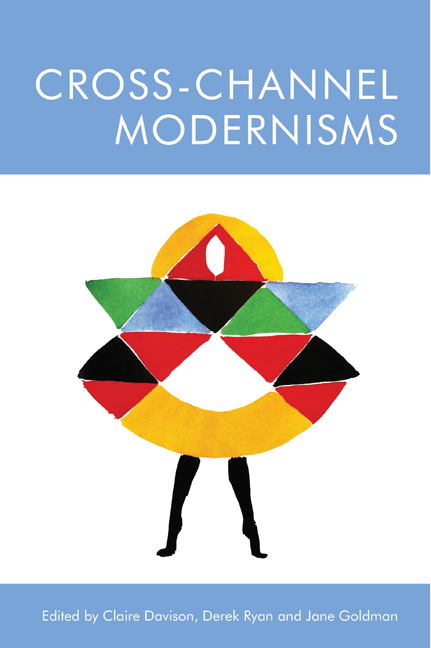Book contents
- Frontmatter
- Contents
- List of Figures
- Notes on Contributors
- Introduction: Cross-Channel (Transmanche) Modernisms
- Interlude: Translating
- 1 On Unknowing French? Rhythm and Le Rythme on a Cross-Channel Exchange
- 2 Impressions of Translation: Ford Madox Ford’s Cosmopolitan Literary Crossings
- 3 Sydney Schiff and Marcel Proust: Table-talk, Tribute, Translation
- Interlude: Fashioning
- 4 Cross-Channel Modernisms and the Vicissitudes of a Laughing Torso: Nina Hamnett, Artist, Bohemian and Writer in London and Paris
- 5 Jean Rhys’s comédie anglaise
- 6 Betray to Become: Departure in James Joyce’s A Portrait of the Artist as a Young Man
- Interlude: Mediating
- 7 Close Up and Cross-Channel Cinema Culture
- 8 Debussy at the Omega Workshops
- 9 Across the Other Channel: Elizabeth Bowen and Modernist Mediation
- Coda: ‘You, who cross the Channel’: Virginia Woolf, Departures and the Spectro-Aesthetics of Modernism 215
- Index
9 - Across the Other Channel: Elizabeth Bowen and Modernist Mediation
Published online by Cambridge University Press: 03 October 2020
- Frontmatter
- Contents
- List of Figures
- Notes on Contributors
- Introduction: Cross-Channel (Transmanche) Modernisms
- Interlude: Translating
- 1 On Unknowing French? Rhythm and Le Rythme on a Cross-Channel Exchange
- 2 Impressions of Translation: Ford Madox Ford’s Cosmopolitan Literary Crossings
- 3 Sydney Schiff and Marcel Proust: Table-talk, Tribute, Translation
- Interlude: Fashioning
- 4 Cross-Channel Modernisms and the Vicissitudes of a Laughing Torso: Nina Hamnett, Artist, Bohemian and Writer in London and Paris
- 5 Jean Rhys’s comédie anglaise
- 6 Betray to Become: Departure in James Joyce’s A Portrait of the Artist as a Young Man
- Interlude: Mediating
- 7 Close Up and Cross-Channel Cinema Culture
- 8 Debussy at the Omega Workshops
- 9 Across the Other Channel: Elizabeth Bowen and Modernist Mediation
- Coda: ‘You, who cross the Channel’: Virginia Woolf, Departures and the Spectro-Aesthetics of Modernism 215
- Index
Summary
The Anglo-Irish writer Elizabeth Bowen has always presented a problem to critics who have wished to place her. Politically conservative but socially liberated, Irish but English, the author of novels and short stories that are experimental narratives of social life, an heir to both Virginia Woolf and Jane Austen, she wrote deeply strange narratives that can and have been understood as expressions of a permanent self-estrangement. She lived between her two countries, feeling English in Ireland and Irish in England, as one of her friends described her, and was, according to her one-time lover, the writer Sean O’Faolain, ‘heart-cloven and split-minded’ when it came to the question of national loyalty (O’Faolain 1982: 15). She is, in this sense, an intensely complex writer of mediations. How can we understand this ‘clovenness’, this ‘split’, of both body and heart, life and text, in Bowen's work? What are the material and textual ways in which it embodies this mediation?
On the question of nationality, Elizabeth Bowen was Irish by birth and English by marriage. But simply describing her as ‘Irish’ does not tell the whole story; she was Anglo-Irish, a product of the Protestant ascendancy, and grew up in one of the Big Houses that were so often targeted during the troubles, finding themselves at the business end of a torch. Even the label ‘Anglo-Irish’ did not quite suit her; Bowen stresses that her father's family, the Bowens, came from Wales, where they were the ap Owens (the name change occurred early in the reign of Elizabeth I), while her mother's people were ‘pure Irish’ – to the extent an Anglo-Irish family could be Irish-Irish (Bowen 2010: 235). This should be explained to the editors of the 1993 North Cork Anthology, who chose to include Bowen in their table of contents with a line through her name, to underscore their total rejection of her as an Irish writer. This crossing-out is just one example of a lifetime, and an afterlife, of crossings for Bowen, her work and our understanding of her as a cross-Channel writer.
Bowen's ambivalent, ambiguous relationship to Ireland may be typically Anglo-Irish, as the historian J. C. Beckett claims, though it may have been exacerbated by the times in which she lived, challenged by Irish bids for independence and two world wars.
- Type
- Chapter
- Information
- Cross-Channel Modernisms , pp. 199 - 214Publisher: Edinburgh University PressPrint publication year: 2020

